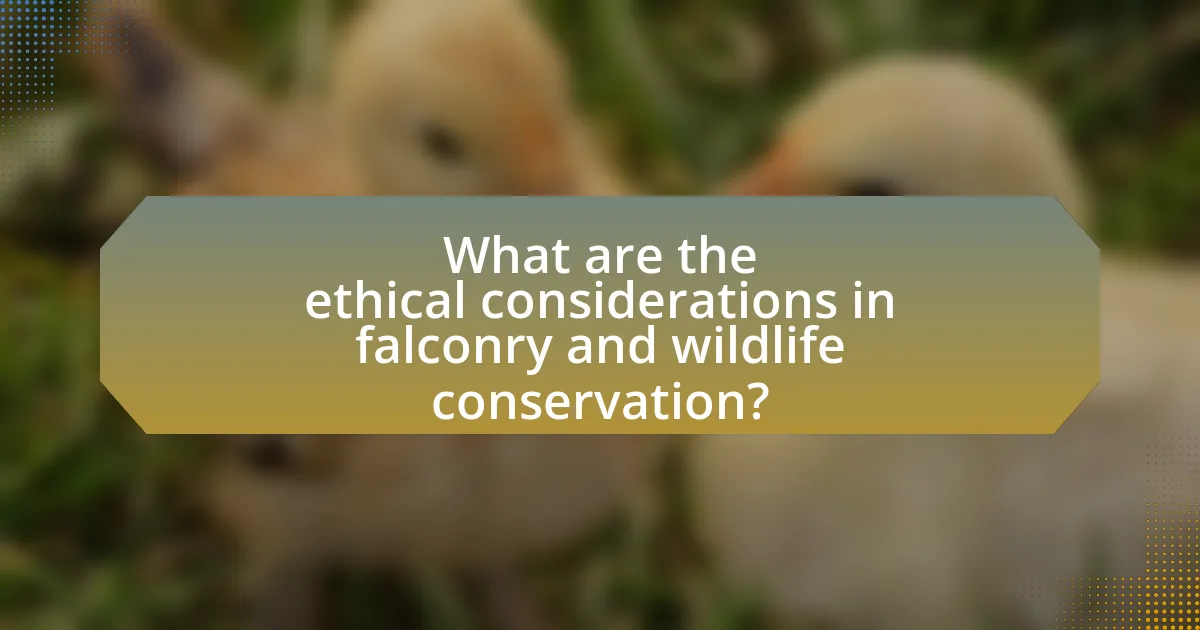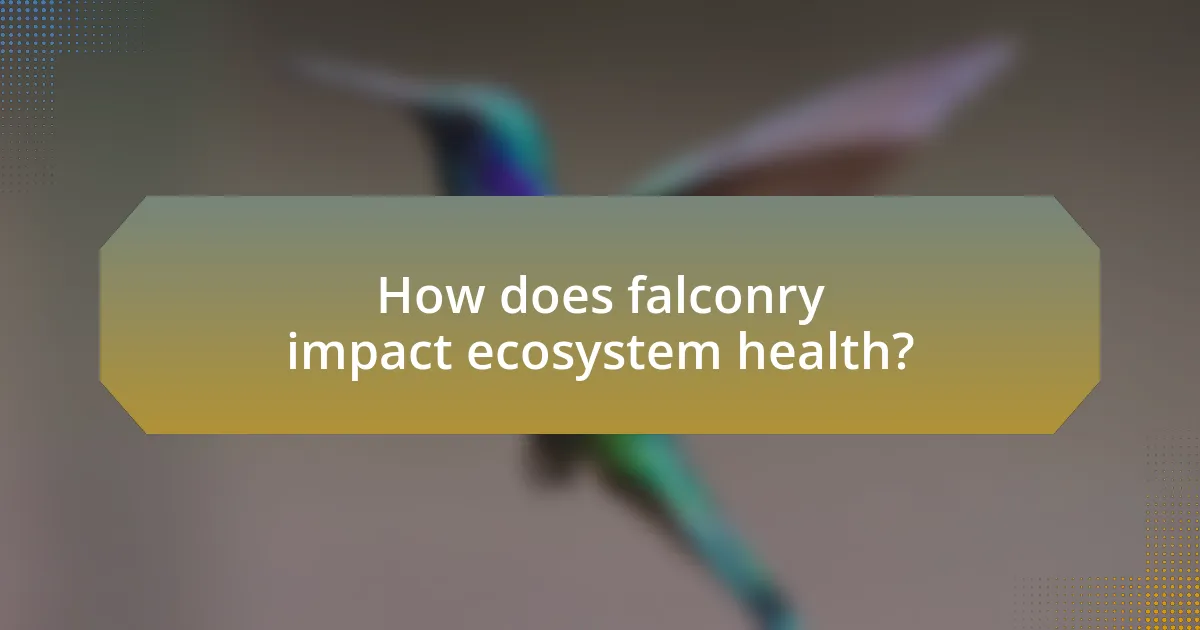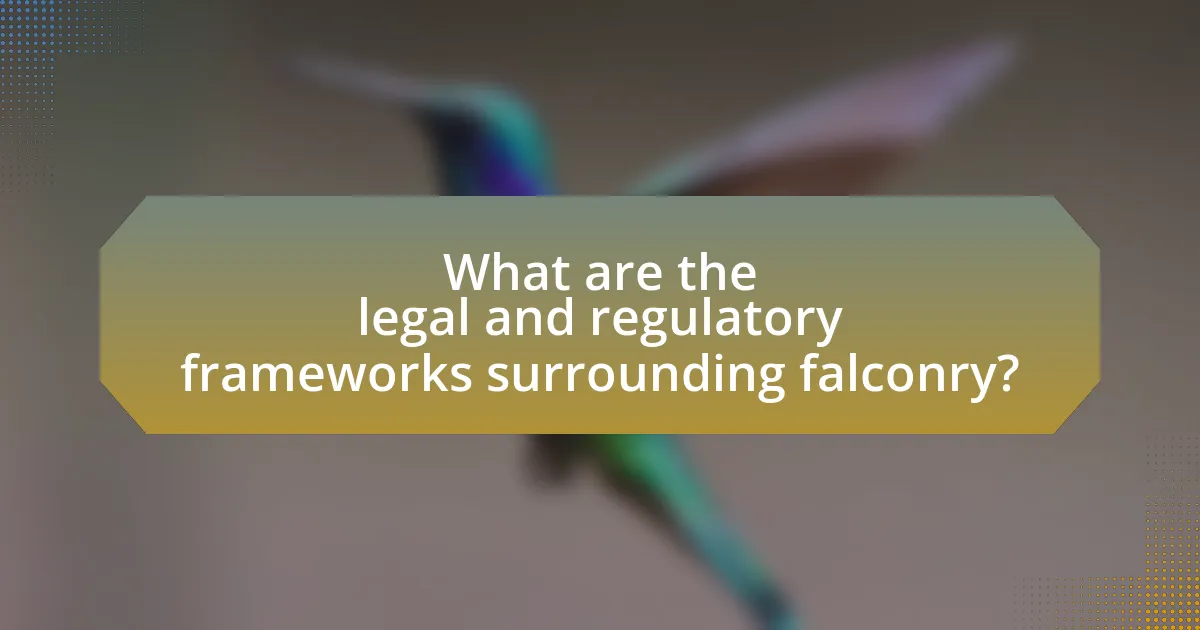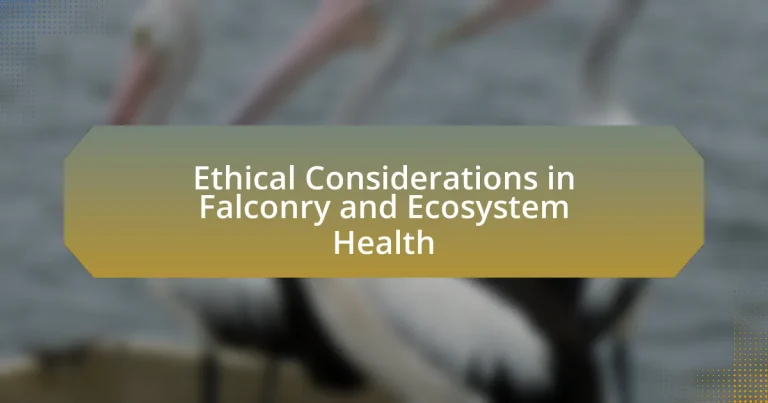The article focuses on the ethical considerations in falconry and its impact on ecosystem health. It examines the welfare of raptors, the responsibilities of falconers, and the implications of falconry practices on local wildlife populations. Key topics include the importance of ethical training and care for birds, the cultural influences on falconry ethics, and the legal frameworks governing the practice. Additionally, the article discusses how falconry can contribute to biodiversity and conservation efforts, while also addressing the potential negative consequences for wildlife. Overall, it highlights the need for sustainable practices that align falconry with ecological preservation.
What are the ethical considerations in falconry?

The ethical considerations in falconry include the welfare of the birds, the impact on wild populations, and the responsibilities of falconers. Ensuring the physical and psychological well-being of raptors is paramount, as improper care can lead to suffering or distress. Additionally, falconry practices must not negatively affect local wildlife populations; for instance, overharvesting or hunting endangered species can disrupt ecological balance. Falconers are also ethically obligated to adhere to legal regulations and conservation efforts, promoting sustainable practices that protect both the birds they train and the ecosystems they inhabit.
Why is ethics important in the practice of falconry?
Ethics is important in the practice of falconry because it ensures the welfare of the birds and promotes sustainable hunting practices. Ethical falconry involves responsible training, proper care, and respect for wildlife, which helps maintain ecological balance. For instance, falconers are often guided by principles that prioritize the health and safety of their birds, as well as the preservation of natural habitats. This ethical approach not only fosters a positive relationship between falconers and their birds but also contributes to conservation efforts, as responsible practices can mitigate negative impacts on local ecosystems.
What ethical dilemmas do falconers face?
Falconers face ethical dilemmas primarily related to the welfare of the birds, conservation issues, and the impact of hunting practices. The responsibility of ensuring the physical and psychological well-being of the raptors can conflict with the traditional practices of falconry, which may involve hunting and training methods that some consider stressful or harmful to the birds. Additionally, falconers must navigate the ethical implications of removing birds from their natural habitats, which can affect local ecosystems and species populations. The balance between preserving the art of falconry and promoting wildlife conservation presents a complex ethical landscape, as falconers must consider both their passion for the sport and the broader ecological consequences of their actions.
How do cultural perceptions influence ethical practices in falconry?
Cultural perceptions significantly influence ethical practices in falconry by shaping the values and norms surrounding the treatment of birds and the practice itself. In regions where falconry is viewed as a prestigious tradition, such as in the Middle East, there is a strong emphasis on the humane treatment of birds, leading to established ethical standards that prioritize the welfare of the falcon. Conversely, in cultures where falconry is less understood or valued, ethical practices may be less stringent, potentially resulting in neglect or exploitation of the birds. For instance, the UNESCO recognition of falconry as an Intangible Cultural Heritage of Humanity highlights the importance of cultural context in promoting ethical practices, as communities are encouraged to uphold humane treatment and conservation efforts.
What are the welfare implications for falcons in falconry?
The welfare implications for falcons in falconry include concerns about their physical health, psychological well-being, and the impact of captivity on their natural behaviors. Captive falcons may experience stress due to confinement, which can lead to issues such as feather plucking and aggression. Research indicates that falcons require adequate space, social interaction, and mental stimulation to thrive; without these, their welfare can be compromised. Additionally, the practice of hunting can fulfill some of their natural instincts, but it must be balanced with proper care and management to ensure their overall well-being.
How does captivity affect the physical and mental health of falcons?
Captivity negatively impacts the physical and mental health of falcons by restricting their natural behaviors and leading to stress-related issues. Falcons in captivity often experience limited space, which can result in physical ailments such as muscle atrophy and obesity due to insufficient exercise. Additionally, the inability to engage in hunting and flying behaviors can lead to psychological stress, manifesting as abnormal behaviors like feather plucking or aggression. Research indicates that captive birds may exhibit higher levels of stress hormones, which can compromise their immune systems and overall health. Studies have shown that falcons raised in captivity often have shorter lifespans and poorer health outcomes compared to their wild counterparts, highlighting the detrimental effects of captivity on their well-being.
What standards exist for the care and training of falcons?
Standards for the care and training of falcons include guidelines established by organizations such as the International Association for Falconry and Conservation of Birds of Prey (IAF) and the North American Falconers Association (NAFA). These standards emphasize the importance of providing proper nutrition, housing, and veterinary care, as well as ethical training practices that prioritize the welfare of the bird. For instance, falconers are encouraged to ensure that their birds have adequate space to fly and exercise, which is crucial for their physical and mental health. Additionally, training methods should be humane and based on positive reinforcement, aligning with the principles of animal welfare.
How does falconry impact ecosystem health?

Falconry positively impacts ecosystem health by promoting biodiversity and controlling prey populations. The practice of falconry involves the use of trained birds of prey to hunt, which helps maintain balanced ecosystems by regulating the numbers of small mammals and birds that can become overpopulated. For instance, studies have shown that raptors can significantly reduce populations of rodents, which, if left unchecked, can lead to crop damage and the spread of disease. Additionally, falconry fosters conservation efforts, as many falconers engage in habitat restoration and species protection initiatives, further enhancing ecosystem resilience.
What role do falcons play in their ecosystems?
Falcons play a crucial role in their ecosystems as apex predators, helping to maintain the balance of populations of their prey, which primarily includes small mammals and birds. By controlling these populations, falcons contribute to the health of their ecosystems, preventing overpopulation and the subsequent depletion of vegetation and other resources. Studies have shown that the presence of falcons can enhance biodiversity by regulating prey species, which in turn supports a variety of other organisms within the food web.
How do falcons contribute to pest control and biodiversity?
Falcons contribute to pest control and biodiversity by preying on small mammals and insects that can become agricultural pests. Their hunting behavior helps regulate these populations, preventing overpopulation that can lead to crop damage and ecosystem imbalance. For instance, studies have shown that the presence of falcons can significantly reduce the numbers of rodents in agricultural areas, which in turn supports healthier crop yields and promotes a balanced ecosystem. Additionally, by maintaining the population dynamics of their prey, falcons play a crucial role in preserving biodiversity, as they help ensure that no single species dominates the ecosystem.
What are the consequences of falconry on local wildlife populations?
Falconry can lead to significant consequences for local wildlife populations, primarily through predation and competition. The practice involves trained birds of prey hunting wild birds and small mammals, which can reduce the populations of these species in the area. Studies have shown that in regions where falconry is prevalent, certain bird species may experience population declines due to increased predation pressure. For example, research indicates that the hunting activities of falconers can impact the breeding success of vulnerable species, as they may lose a higher proportion of individuals to predation. Additionally, the introduction of trained raptors into local ecosystems can create competition for food resources, further stressing local wildlife populations.
How can falconry practices be aligned with conservation efforts?
Falconry practices can be aligned with conservation efforts by promoting the breeding and rehabilitation of raptor species, which helps maintain biodiversity. Falconers often participate in conservation programs that focus on habitat restoration and the protection of endangered birds of prey. For instance, organizations like the Peregrine Fund have collaborated with falconers to successfully reintroduce peregrine falcons into their natural habitats, demonstrating the positive impact of falconry on species recovery. Additionally, falconry can raise public awareness about the importance of raptors in ecosystems, fostering a culture of conservation among practitioners and the community.
What initiatives exist to promote sustainable falconry?
Initiatives to promote sustainable falconry include the establishment of guidelines by organizations such as the International Association for Falconry and Conservation of Birds of Prey (IAF) and the development of educational programs focused on ethical practices. These initiatives aim to ensure that falconry is practiced in a manner that respects wildlife conservation and ecosystem health. For instance, the IAF has created a code of conduct that emphasizes the importance of responsible breeding, training, and hunting practices, which helps to mitigate the impact on local bird populations and habitats. Additionally, various conservation programs work to rehabilitate and protect raptor species, further supporting sustainable falconry practices.
How can falconers contribute to habitat preservation?
Falconers can contribute to habitat preservation by actively participating in conservation efforts and promoting awareness of ecosystem health. Through their work, falconers often engage in habitat restoration projects, such as planting native vegetation and removing invasive species, which directly benefits local wildlife. Additionally, falconers educate the public about the importance of preserving natural habitats for raptors and other species, fostering a greater appreciation for biodiversity. Studies have shown that community involvement in conservation, including activities led by falconers, can lead to improved habitat conditions and increased species populations, demonstrating the effectiveness of their contributions to ecosystem health.
What are the legal and regulatory frameworks surrounding falconry?

The legal and regulatory frameworks surrounding falconry vary significantly by country and region, often governed by wildlife conservation laws and specific falconry regulations. In the United States, for example, falconry is regulated under the Migratory Bird Treaty Act and the Bald and Golden Eagle Protection Act, which require permits for the capture and possession of raptors. Additionally, each state has its own regulations that dictate licensing, training, and the types of birds that can be used in falconry. In the European Union, falconry is regulated under the Birds Directive, which aims to protect wild birds and their habitats, while individual member states implement specific falconry laws. These frameworks are designed to ensure the sustainable practice of falconry, protect bird populations, and promote ethical treatment of raptors.
What laws govern falconry practices in different regions?
Laws governing falconry practices vary significantly across different regions, reflecting local wildlife conservation efforts and cultural traditions. In the United States, the Migratory Bird Treaty Act regulates the capture and use of migratory birds, requiring falconers to obtain federal and state permits. In the United Kingdom, the Wildlife and Countryside Act 1981 governs the practice, mandating that falconers must have a license and adhere to specific welfare standards for birds of prey. In the Middle East, falconry is often protected as a cultural heritage, with regulations focusing on the conservation of species and sustainable practices. These laws are designed to ensure the ethical treatment of birds and the preservation of ecosystems, highlighting the importance of responsible falconry practices.
How do these laws protect both falcons and ecosystems?
Laws protecting falcons and ecosystems achieve this by regulating hunting practices and habitat conservation. These regulations ensure sustainable populations of falcons, which are vital for maintaining ecological balance as they control prey species and contribute to biodiversity. For instance, the Migratory Bird Treaty Act in the United States prohibits the hunting of certain falcon species, thereby safeguarding their populations and the ecosystems they inhabit. Additionally, habitat protection laws prevent the destruction of critical nesting and hunting areas, further supporting both falcon conservation and overall ecosystem health.
What are the penalties for unethical falconry practices?
Penalties for unethical falconry practices can include fines, imprisonment, and the revocation of falconry licenses. In many jurisdictions, violations of falconry regulations, such as illegal trapping, improper care of birds, or failure to adhere to conservation laws, can result in monetary fines that vary widely depending on the severity of the offense. For instance, in the United States, fines can range from hundreds to thousands of dollars, while more serious infractions may lead to imprisonment for up to several years. Additionally, authorities may revoke a falconer’s license, preventing them from practicing falconry in the future. These penalties are enforced to ensure the ethical treatment of birds and the protection of wildlife populations.
How can falconers ensure ethical practices in their activities?
Falconers can ensure ethical practices in their activities by adhering to established guidelines and regulations that prioritize the welfare of the birds and the ecosystem. This includes obtaining proper permits, ensuring that birds are sourced legally and ethically, and providing adequate care, training, and nutrition to the raptors. Additionally, falconers should engage in conservation efforts, such as habitat preservation and species protection, to support ecosystem health. Research indicates that responsible falconry practices contribute to the conservation of raptor populations and their habitats, reinforcing the importance of ethical standards in the sport.
What best practices should falconers follow to promote welfare and conservation?
Falconers should prioritize the health and well-being of their birds by providing proper nutrition, veterinary care, and appropriate housing. Ensuring that birds receive a balanced diet tailored to their species is essential for their physical health and longevity. Regular veterinary check-ups help identify and treat health issues early, promoting overall welfare. Additionally, housing should mimic natural conditions as closely as possible, allowing for adequate space, enrichment, and safety.
Falconers must also engage in responsible breeding practices to avoid genetic issues and contribute to the conservation of raptor populations. By participating in breeding programs that focus on genetic diversity, falconers can help maintain healthy populations of birds in the wild.
Furthermore, falconers should educate themselves and the public about the importance of raptor conservation and the role these birds play in ecosystems. This includes advocating for habitat preservation and supporting conservation initiatives. By raising awareness, falconers can foster a greater appreciation for raptors and their ecological significance.
Lastly, falconers should adhere to legal regulations and ethical guidelines governing falconry, ensuring that their practices align with conservation goals. Compliance with these regulations not only protects the birds but also supports broader conservation efforts.
How can education and community engagement enhance ethical falconry?
Education and community engagement can enhance ethical falconry by promoting awareness of best practices and fostering a culture of responsibility among practitioners. Educational programs can inform falconers about the ecological impacts of their activities, emphasizing the importance of species conservation and habitat protection. Community engagement initiatives, such as workshops and local events, can facilitate knowledge sharing and collaboration among falconers, wildlife experts, and the public, leading to a collective commitment to ethical standards. Research indicates that informed falconers are more likely to adhere to ethical guidelines, which ultimately benefits both the birds and the ecosystems they inhabit.


